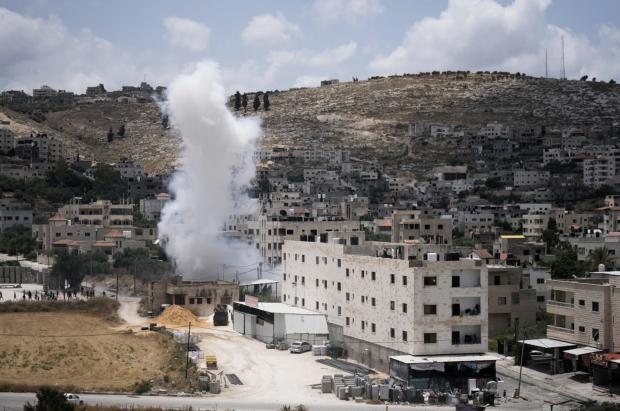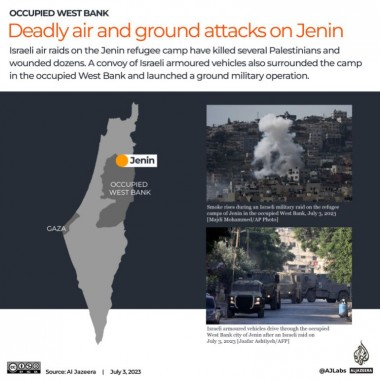1 August 2023
The Battle of Jenin and Future of Palestinian National Democracy

A new conversation is urgently needed about the future direction of the Palestinian struggle; one which is focused upon the reasons for, and necessity of, political unity and an agreed strategy.
Throughout 2022, the Israeli state’s onslaught across Palestine intensified; with missile attacks against Gaza; increased military incursions into the West Bank, combined with accelerated illegal settler expansion; ongoing repression against Palestinians inside Israeli borders; and unremitting acts of provocation at the Al Aqsa mosque site.
The Mondoweiss agency reported that more than 230 Palestinian adults and children were killed by the end of 2022.
This represented the context for the Israeli general election last November.
However, it also foreshadowed a new strategic escalation of Israel’s occupation which has been prosecuted relentlessly throughout 2023. To date, according to Al Jazeera, over 200 Palestinian citizens have already been killed by Israeli soldiers and settlers.
The most extremist administration in the history of Israel is in government. Its decisions to overhaul the judiciary and unleash a power grab since coming into office have brought huge divisions to the fore in Israeli society.
Former leading figures within the security and military infrastructure have publicly challenged the Prime Minister and his cabinet while tens of thousands have protested weekly for over six months.
At the same time the Israeli occupation of Palestine and associated colonial settler strategy have been relentlessly executed.
The present numbers of Palestinian homes being demolished and implementation of land dispossessions, alongside the construction of new settlements are unprecedented. Terror attacks on Palestine neighbourhoods by Israeli settlers, including large scale pogroms in places like Turmus Ayya and Huwara have become integral to the Israeli state strategy.
Shoot to kill operations are being frequently carried out in the West Bank. Military incursions occur regularly in cities such as Ramallah and Nablus, where the Palestinian Authority is meant to have full civil, political and security control.
The current Israeli government is driving this dangerous spiral of state sponsored violence.
The fanatical aggression of the administration is reflected in calls by the finance minister for more military operations to destroy Palestinian property, expand settlements, and ‘if need be’ to kill thousands. The Prime Minister was reported in the Times of Israel, over six weeks ago as saying that Israel should ‘crush the Palestinian ambition for an independent state’. Meanwhile another government minister has publicly denounced Palestinians as a non-people.
The decisions and actions of this Israeli government have brought the situation to a cliff edge.
There is a widespread belief that the ‘two state’ compromise has been irreversibly hollowed out. Successive Israeli governments have systematically usurped the Oslo Accords, to the extent that the Palestinian Authority increasingly resembles nothing more than a patchwork of disconnected, and ever-shrinking Bantustans.
The undermining of the Palestinian Authority’s political legitimacy, and the crisis at the heart of its existence are being used to delegitimise the very basis of Palestinian statehood and sovereignty.
These contradictions are reflected by the disunity within the Palestinian liberation struggle and major divisions between the main political forces, and in some cases serious disagreements within individual parties.
Yet in the midst of this leadership disunity and lack of cohesion, new models of localised political unity and organised popular resistance have begun to emerge in key centres like Jenin and Nablus.
These form the backdrop to the invasion of the Jenin refugee camp at the start of July by 1,000 Israeli troops, including specialist combat units, and heavy demolition equipment. The ground invasion was preceded by drone and missile attacks against this densely populated refugee camp, and adjacent Jenin city.
Two days of intense street fighting ensued between Israeli troops and less well armed resistance fighters.
Twelve Palestinians, including five children, were killed, and one Israeli soldier. An estimated $40 million of damage was caused to buildings, water and sewage infrastructure, power supply networks, and other vital public services. Homes, public buildings and other property were literally bulldozed, both within Jenin camp and city.
At the height of the fighting, over three thousand residents fled the camp. Refugees who had made Jenin their home became refugees once again.
Jenin has long been a cockpit of armed and popular resistance against the occupation.
Its significance is that the resilience of armed and popular resistance is based upon agreement and unity among all of the local forces organised on the ground, and a political leadership which commands popular community support. The same phenomenon has now emerged in Nablus.
It is also clear that the resistance fighters have developed an enhanced combat capacity and sophistication, to the extent that the Israeli military can no longer rely upon operational freedom in this part of the West Bank.
The Israeli operation was an attempt to take back the military initiative, clear the way for increased settlements, and, to crush Palestinian morale.
But while the incursion inflicted colossal physical destruction and extreme human suffering, and a massive displacement of families, the operation failed.
The armed resistance remained consistent until the Israeli forces withdrew. The resistance leaders and fighters evaded capture with their weapons.

- Source: Al Jazeera
The battle of Jenin was an international propaganda disaster for the Israel government. Palestinian national consciousness across the West Bank and Gaza has since been dramatically energised.
For those among the Israeli establishment and progressive political opinion already concerned about the extremist agenda of the administration, its motivations for the decision to attack Jenin should give further pause for thought.
Fundamental ethical and political questions arise for the international community.
The UN rapporteurs on Palestine have already concluded that war crimes were committed by Israel in Jenin. It is beyond dispute that international law was repeatedly violated.
Persistent refusal by multi-lateral institutions and foreign governments to act and enforce international law and sanctions against Israel is increasingly making them complicit in the oppression of the Palestinian people.
The Irish government in particular has no justification for further equivocation. The failure to use its influence while holding Ireland’s seat on the UN Security Council was a lost opportunity. It should now follow the example set by the Portuguese parliament.
The Irish state could become a global leader against the occupation and system of apartheid in Palestine, by finally recognising the state of Palestine, and passing into domestic law the Occupied Territories Bill and the Illegal Israeli Settlement Divestment legislation.
Jenin also raises significant issues for the Palestinian national struggle.
It should be an incentive for the fragmented national leaderships to finally develop a genuine political unity.
The continued division among Palestinian forces is a strategic weakness. Refusal or reluctance to subordinate political differences, enmities or patronage, and agree key strategic priorities and objectives will inevitably impede the successful development of new initiatives.
Consensus will not be achievable on every single policy or tactic, but by addressing the reasons for achieving unity, instead of fixating on the causes of disunity, then agreement upon a strategic national agenda is possible.
Political unity has existed among Palestinian prisoners from all organisations within the jails.
That shared perspective on unity is what guides the momentum for popular resistance, not only in Jenin, but increasingly across the West Bank, among grass roots militants attached to all political forces, as well as non-aligned activists.
This ability to achieve political agreement and solidarity among the people is moving ahead of the Palestine Authority and the leaderships of the various political forces.
The Battle of Jenin demonstrates the unbreakable nature of the Palestinian spirit of resistance, even when confronted with military superiority.
This should serve as a compelling reality for Israeli state and society.
Opposition to the occupation and settler colonialism is now inter-generational among Palestinians.
Israeli politics, civic society and the security and military infrastructure are not monolithic. The pragmatists and realists need to internalise that there is no alternative to a genuine democratic settlement with Palestinian leaders.
Until that happens the implications of maintaining the occupation in Palestine will act like a cancer poisoning Israel from within. The occupation and its resultant settlement strategy and apartheid system have spawned a fascist like ideology at the heart of government, which is responsible not only for the oppression of Palestinians, but also the unfolding all out assault against Israel’s judicial institutions.
The scale of crisis engulfing the Israeli state, poses a stark strategic question; that is, whether Israel can evolve from this turmoil into a liberal democratic state which accepts the national democratic rights of all the Palestinian people.
Events in Jenin may yet represent a turning point.
A potential opportunity has undoubtedly opened up for the Palestinian Authority and the leaderships of all national parties and movements, to collectively and fundamentally rethink their political approaches to political unity and co-operation.
More than three generations of activists have been engaged in sustained, continuous popular resistance in pursuit of national freedom since 1967.
A new conversation is urgently needed about the future direction of the Palestinian struggle; one which is focused upon the reasons for, and necessity of, political unity and an agreed strategy.
Jenin should become the catalyst for that conversation. This is the unavoidable democratic challenge which faces all Palestinian political and civic leaders.
Follow us on Facebook
An Phoblacht on Twitter
Uncomfortable Conversations

An initiative for dialogue
for reconciliation
— — — — — — —
Contributions from key figures in the churches, academia and wider civic society as well as senior republican figures





